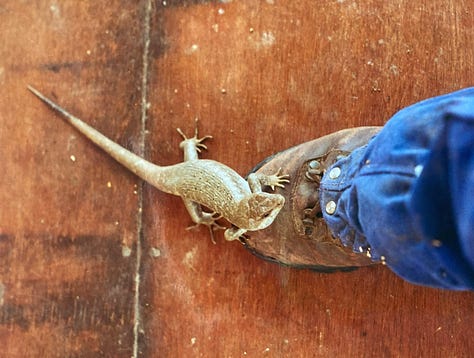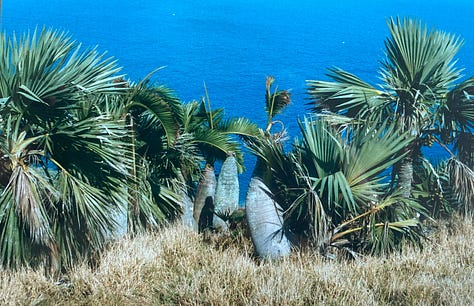One good turn
A strange ritual from Mauritian conservationists (3 minute preview, 6 minute read)
When I was staying in Mauritius, I got used to the company of Asian house geckos. As their name implies, they are quite happy inhabiting houses. I would usually see them somewhere up high, like the ceiling, during the evening. However, I would hear them much more often than I’d see them. The have a distinctive call, a loud chirp. It’s hard to believe such a large sound comes from such a tiny gecko (I’ve linked to a video here which includes images of the gecko as well as the call.)
Also as its name implies, this gecko is native to south and south-east Asia. It’s largely a tropical species – it has hitched a ride to New Zealand on cargo many times, but it has so far found the climate too cold. The climate in Mauritius is perfect, though, and the gecko was widespread.
While I’ve got a soft spot for these reptiles, conservationists suspected that they affected Mauritius’s own geckos, which are found nowhere else in the world. When I was there, a PhD student from England was studying their interactions, and his research has since confirmed that the Asian house gecko is contributing to the decline of Mauritian geckos.
Round Island was the most important place in Mauritius for reptiles, at least partly because its inaccessibility meant that there were no Asian house geckos there. But having a full-time ranger, as well as regular visitors involved with restoration, meant that there was more cargo than ever being carried to the island. We had to be extremely careful packing equipment and supplies.



Almost everything taken to the island was carried in large plastic drums. These were packed in pest-proof rooms on the mainland and then transported to the helicopter pad (or the wharf for those who weren’t lucky enough to go by helicopter). Then, on the helicopter pad with the Mauritian police looking on, we would undertake what looked like a bizarre ritual. We would take each drum and rotate it. We would turn it upside down and then back to its original position – I can’t remember how many times we did it for each drum but we definitely rotated every one.
The reason for this ritual was the Asian house gecko. Although we did all we could to avoid packing any in the drums, we could have missed one. Even easier to miss would be a few eggs. However, unlike bird eggs, reptile eggs can be killed by being rotated. Rotating the cargo was one of, but not the only, unusual biosecurity measures for visiting Round Island.
Another unusual biosecurity measure was that you were not allowed to eat raw tomatoes for a week before going to Round Island. Why not? Because tomato seeds pass through the human gut intact. There were enough weeds on Round Island already. Nobody wanted tomato plants sprouting everywhere when the compost from the composting toilet was eventually used to rebuild the island’s soil. If that sounds unlikely, it’s not. I saw tomato seedlings sprouting in some of the solid waste from the McMurdo Station sewage treatment plant in Antarctica. This waste was bagged up and shipped back to New Zealand for disposal, so even if tomatoes could grow in Antarctica, they wouldn’t get the chance.



When we arrived on Round Island, all the cargo was carried into the hut, and the doors and windows were closed. Then, in the stifling heat, we unpacked everything and performed one final check to see that we hadn’t brought any geckos, mice or other pests.




